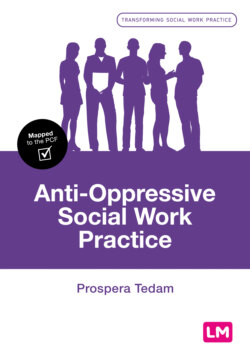Читать книгу Anti-Oppressive Social Work Practice - Prospera Tedam - Страница 19
На сайте Литреса книга снята с продажи.
Language and oppression
ОглавлениеWe will argue throughout this book that language perpetuates power and influences power relations which are used to maintain oppression. When women are shamed, mothers are blamed consciously or unconsciously through social worker reports; such language serves to perpetuate the oppression of women. Language can be gendered and can perpetuate different types of oppression. For example, there is growing concern about some of the ‘professional’ language used by social workers and arguments being made about the need to change this. ‘Mother and baby groups’ has been changed to ‘parenting groups’ to reflect the diversity of parents and to acknowledge the role of others in the parenting role. ‘Looked after children’ or ‘children looked after’ is being replaced by ‘care experienced’, and phrases such as ‘contact time’ are being ditched for a preferred and less oppressive ‘family time’. This evidences the dynamic nature of language and the importance of regularly checking with service users how they wish to be addressed.
Continuing the theme of language and oppression, the COVID-19 pandemic is showing little sign of abating (June 2020), and in the UK and USA it has been found to be impacting disproportionately on Black minority ethnic people. The language used in some of the reporting is noteworthy and promotes the view that the reasons for disproportionality are down to individual biological and genetic make-up rather than structural inequalities. The scientific explanation for this is still to be verified; however, there are also concerns that nurses and health professionals from Black and/or other minority ethnic backgrounds are being pushed and made to take shifts on COVID-19 wards in hospitals (Nursing Times, 18 April 2020). In addition, in the UK and the USA, Black people are more likely to live in overcrowded neighbourhoods and have jobs which make it difficult to practise social distancing or self-isolation. Such structural and institutional oppression needs to be exposed for what it is and replaced with fairer, more equitable processes of work allocation among health professionals. This also reminds us of the fact that having good health is a privilege, which is often invisible to its bearers. Burke and Parker (2007) argue that the failure to recognise difference of all kinds enables a culture of exclusion and exclusionary behaviours, something that social workers must avoid if they are to work anti-oppressively.
Wilson and Beresford (2000) remind us of the importance of understanding oppression and anti-oppressive practice from the perspective of service users. To this end, Haworth (2019), writing about social work with single fathers in the UK, concluded that single fathers continue to be invisible in social work research and that gendered stereotypes accounted for them experiencing alienation in social work practice encounters. He argues that a more inclusive approach would be in line with social work values, ethics and anti-oppressive practice.
